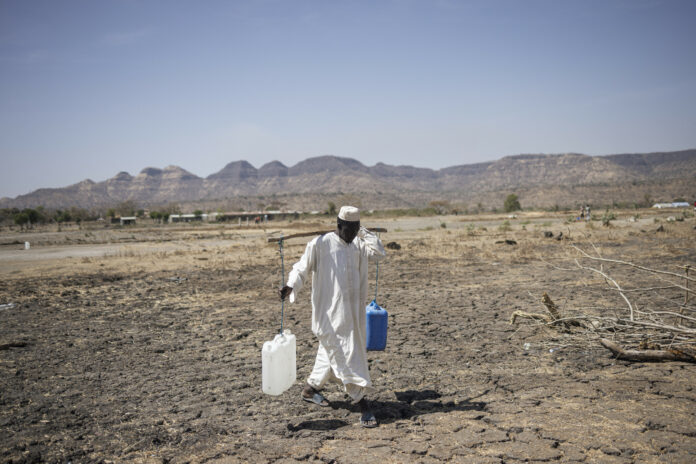Humanitarian workers are extremely frustrated that the conflict and hunger in Sudan is hardly getting any media attention. The civil war between the Sudanese Armed Forces (SAF) and the Rapid Support Forces (RSF) has gone on for almost a year, endangering the lives of millions.
Over 8 million people been uprooted from their homes, losing everything. Sudan is now the world’s largest displacement crisis. Food shortages are worsening across the country and starvation is occurring. But you rarely hear about it in the news.
I recently listened to a briefing from the Sudan directors of CARE, the International Rescue Committee (IRC), and the Norwegian Refugee Council. They warn of potential famine.
The fighting has spread into Sudan’s main agricultural areas, destroying precious farmland. Farmers cannot grow food as the conflict rages on. Sudan’s harvest is now reduced, worsening hunger in the already impoverished country.
“Attacks in mid-December interrupted the main season harvesting and cultivation of winter wheat in highly productive areas of Sudan, and we are expecting major impacts on national food availability,” said Emily Turano of the Famine Early Warning Systems Network (FEWS NET).
To make matters worse, the humanitarian agencies in Sudan are not getting enough funding to help the victims of the civil war. These charities depend on support from governments and the public.
Only 5 percent of the required funding for the humanitarian response in Sudan has been received, according to the United Nations. The international community must do more to get a ceasefire in Sudan and increase humanitarian funding.
I asked the country directors about the plight of refugees fleeing Sudan into neighboring Chad and South Sudan. They said food is in short supply in those countries, too. Chad and South Sudan also suffering from severe hunger.
MICHELE SPATARI/AFP via Getty Images
Sudanese refugees are “looking for food, and they are crying because they are hungry and their children hungry. This is for real. This is what is happening in Eastern Chad and South Sudan,” said Fatima Ahmed, president of Zenab for Women in Development, a partner of CARE.
The refugees from Sudan may have escaped the violence in their country, but they cannot escape the reality of hunger.
“Across the region, nearly 28 million people face acute food insecurity with 18 million in Sudan, 7 million in South Sudan, and nearly 3 million in Chad,” said Carl Skau, deputy director of the U.N. World Food Program (WFP), speaking before the U.N. Security Council on March 20. Again, the lack of funding limits the ability to feed the hungry in these nations.
WFP has been trying to preposition food in Chad ahead of the rainy season, but without funding they cannot do it. That means more hunger awaits the Sudanese refugees there. And if the war continues, more people will be fleeing into impoverished South Sudan and Chad.
If the international community does not increase funding, hunger and malnutrition will worsen drastically in Sudan and the entire region.
“Reports indicate that over 700,000 children already suffer from malnutrition, a number that could rise to 3.5 million before the end of the year. In Zamzam camp in North Darfur, it is estimated that a child dies every two hours,” the charity CARE said, warning about the rising malnutrition in Sudan.
Sudan desperately needs our help. Think of the families that have lost everything and are facing starvation. They long for peace and food.
“Four million children have been displaced. That’s 13,000 children every single day for 300 days. Safety, gone. Worldly possessions, gone. Friends and family members separated or lost. Hope, fading,” said spokesperson James Elder of UNICEF after visiting Sudan and seeing destroyed communities.
We could help give some hope to Sudan by increasing funding for food so more war victims can get nutrition and medicine to survive. By increasing attention on Sudan, we can muster more political support to ensure a ceasefire.
No peace plan can succeed without humanitarian aid. Even before the war began, Sudan was suffering in hunger. Now amid the civil war, the country faces its worst level of hunger in its history. Sudan’s war victims will starve to death if the world does not act now.
William Lambers is an author who partnered with the U.N. World Food Program (WFP) on the book Ending World Hunger. His writings have been published by The Washington Post, History News Network, Cleveland’s The Plain Dealer and many other news outlets. Lambers recently volunteered to write the Hunger Heroes section of WFP’s online learning game Freerice.
The views expressed in this article are the writer’s own.
Uncommon Knowledge
Newsweek is committed to challenging conventional wisdom and finding connections in the search for common ground.
Newsweek is committed to challenging conventional wisdom and finding connections in the search for common ground.


